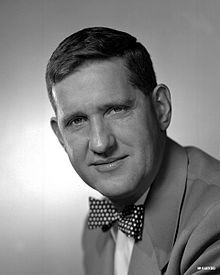Harold Agnew | |
|---|---|
 Agnew in 1955 | |
| Born | Harold Melvin Agnew March 28, 1921 Denver, Colorado, U.S. |
| Died | September 29, 2013 (aged 92) Solana Beach, California, U.S. |
| Education | University of Denver (BA) University of Chicago (MS, PhD) |
| Known for | Succeeded Norris Bradbury as director at Los Alamos |
| Awards | E. O. Lawrence Award (1966) Enrico Fermi Award (1978) |
| Scientific career | |
| Fields | Physics |
| Institutions | Los Alamos National Laboratory |
| Thesis | The Beta-spectra of Cesium-137, Yttrium-91, Chlorine-147, Ruthenium-106, Samarium-151, Phosphorus-32, and Thulium-170 (1949) |
| Doctoral advisor | Enrico Fermi |
Harold Melvin Agnew (March 28, 1921 – September 29, 2013) was an American physicist, best known for having flown as a scientific observer on the Hiroshima bombing mission and, later, as the third director of the Los Alamos National Laboratory.[1]
Agnew joined the Metallurgical Laboratory at the University of Chicago in 1942, and helped build Chicago Pile-1, the world's first nuclear reactor. In 1943, he joined the Los Alamos Laboratory, where he worked with the Cockcroft–Walton generator. After the war ended, he returned to the University of Chicago, where he completed his graduate work under Enrico Fermi.[2]
Agnew returned to Los Alamos in 1949, and worked on the Castle Bravo nuclear test at Bikini Atoll in 1954. He became head of the Weapon Nuclear Engineering Division in 1964. He also served as a Democratic New Mexico State Senator from 1955 to 1961, and was the Scientific Adviser to the NATO Supreme Allied Commander Europe (SACEUR) from 1961 to 1964. He was director of the Los Alamos National Laboratory from 1970 to 1979, when he resigned to become President and Chief Executive Officer of General Atomics. He died at his home in Solana Beach, California, on September 29, 2013.[3]
- ^ "Harold Agnew". Atomic Heritage Foundation. Retrieved November 28, 2022.
- ^ "Harold Agnew with the Plutonium Core | Photographs | Media Gallery". www.atomicarchive.com. Retrieved November 28, 2022.
- ^ Press, William H. (November 26, 2013). "Harold Agnew, physicist, atomic bomb Everyman". Proceedings of the National Academy of Sciences. 110 (48): 19179–19180. Bibcode:2013PNAS..11019179P. doi:10.1073/pnas.1319623110. ISSN 0027-8424. PMC 3845108. PMID 24248340.